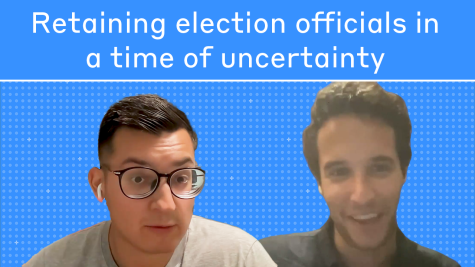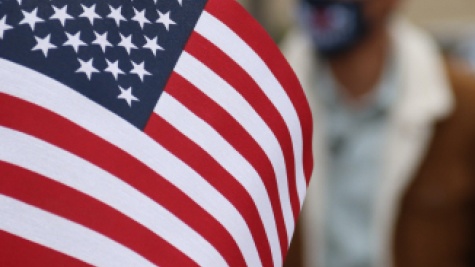How Can Researchers and Election Administrators Work Together?
MEDSL Founding Director Charles Stewart III interviewed Mara Suttmann-Lea of Connecticut College, Lia Merivaki of Mississippi State, and Veronica Degraffenreid of the Pennsylvania Department of State about their experiences working with researchers and election administrators, and what opportunities they see for collaboration between academics and practitioners.
We have included excerpts from their interview here; you can view the full interview on YouTube.
Charles asked the question:
What opportunities exist for the research community and the community of election administrators to work together?
Mara Suttmann-Lea
Assistant Professor of American Politics, Connecticut College
I have been in touch with the Pennsylvania Department of State for the better part of a year now just working on facilitating the development of a relationship. We have started with my offering insight about what the election sciences community tells us about the voter education interventions that are effective.
I happened to pull up a list of the different voter education outreach activities that Lia and I have collected. Even if we’re not talking about conducting new research or obtaining new data, there is value in researchers who have looked at the literature, have studied the literature, and who have done the research, who can communicate to state and local election officials, “here’s what works, here’s what seems like it has an effect.”
I do think that there are some possibilities — for post-primary, pre-general elections — for state and local election officials to work with researchers to assess their efforts. My word of caution is that it would be worth doing some preliminary assessment with the understanding that primary electorates are very different from general electorates. However, overall I have noticed, just from a researcher’s perspective, that it is enlightening to speak with state and local election officials and to hear more about what’s directly happening on the ground and I feel like the collaboration can be so mutually beneficial and also just beneficial in terms of more broadly supporting our democracy.
Lia Merivaki
Assistant Professor in American Politics, Mississippi State University
I can speak of my experience here in Mississippi and in Florida too. Building a partnership with local election officials — that is key. And that is based on my experience working in a state that has a more bottom-up approach of managing elections. Some local election officials have been very receptive and interested in working with researchers — even my students get involved. We examine what the localities do to increase awareness in the community. How might we publicize them or bring election officials into the community to raise awareness on who the election officials are and what they do? That has been great! And we know that throughout the state, there are many researchers who are doing this; we’re not the only ones.
What we don’t know is how much of this is happening: we only hear the stories that are published in research and in the news. My word of caution, similarly to what Mara said, is to think of how we can find the best way to know what is happening across every jurisdiction within each state. That is a major challenge but it can also be an opportunity for researchers to come together. It cannot necessarily be one individual researcher doing everything, so this brings opportunities for collaboration among researchers but also to share ideas among local election officials and state officials as well. This is a great opportunity for others to see best practices, see what we have thought about, and share experiences so that they can learn from each other.
Like Mara said, this is a great opportunity to do a trial run with the primaries and see how we can manage information flow before Election Day and also the voter flow on Election Day, because as you have noted in the past, Charles, voters are going to choose to vote in different ways depending on what their state permits so it’s important for local officials to know how to manage the lines among other things.
Veronica Degraffenreid
Special Advisor on Election Modernization, Pennsylvania Department of State
There are two approaches to this, which I tried to do in North Carolina and certainly here in Pennsylvania. Working with staff here it will be similar.
The first approach involves voter outreach and also outreach to anyone: to the media and certainly to researchers. It’s so important to provide good data and make sure that researchers have access to that data so they don’t have to dig for it. We also need to explain what the data mean and what our processes are so that as you are doing research, even if you’re not interacting with us directly and there’s no collaboration, hopefully good researchers will know what they’re researching. The researchers should make sure that they’re thorough and accurate so that when they are looking at data, they’re doing it in a way that is truthful.
The second approach is collaboration and so that’s a champion as well. I love collaborating. I can’t always collaborate with every single research group — elections administrators get a lot of requests for collaboration and we just truly don’t always have the time for that. When we do have time just being able to look at it or have someone point us in the right direction helps. Sometimes we don’t have the expertise in a specific area or maybe sometimes we don’t have the time to address it, so being able to collaborate with different researchers is helpful. We need to know that we are on the right track.
In 2016, here in Pennsylvania, 107,000 Pennsylvania voters participated with absentee vote-by-mail in the 2016 presidential primary. In 2020 so far, over 1.6 million Pennsylvania voters have requested a vote-by-mail ballot. We don’t know yet how many have returned, but it’s certainly well over 107,000. So that’s data that we would want to dig into and we would love to have researchers help us pinpoint what worked, what didn’t work. When did you see the peaks? Certainly looking at the primary, how many of those voters perhaps chose not to return their ballot? Why? Did they go in-person to vote? Those are the types of questions that I think are important for us because they may help tell a story that will drive better processes. That’s the way I look at data research and analysis and I enjoy the collaboration and partnership with responsible researchers.


